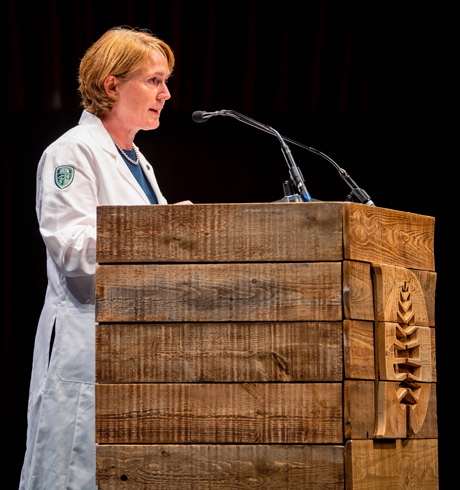Photos by Kurt Wehde
Ninety-two members of the Geisel School of Medicine MD Class of 2025 received their white coats on August 28 and were welcomed into the profession of medicine during the school’s annual White Coat ceremony—an important ritual for first-year medical students. The White Coat is the most iconic symbol in medicine representing the bond of trust between those who wear it and their patients.
Sonia Nagy Chimienti, MD, Geisel’s new senior associate dean of medical education, warmly welcomed the first-year medical students to this special day, “It is truly wonderful to be able to gather together, as a community, in person, to celebrate this important milestone in the educational journeys of these medical students.”
She recalled the day she unceremoniously received her neatly folded, crisp white coat, “There was no discussion of the meaning of the white coat, and no friends and family members gathered to celebrate with us. But even without an event, there was a significance to each of us when we first unfolded and shook out the coat, holding it up and looking at it, wondering if it would fit. Wondering if we were ready to wear it.

“As my career evolved, the coat gained more meaning. My white coat symbolizes my place as part of a team and reminds me daily of the teamwork that is an essential part of medical care; it represents the trust that all health care professionals, from aids and technicians to nurses and doctors, must have in each other, as members of a team that will work together to deliver the highest quality of patient care,” she said. “As I recall the significance of the white coat to me those many years ago, I would like to encourage you to consider the significance of the white coat to you, when you are coated today.”
She then encouraged the medical students to fully engage with the faculty as true partners in their education.
Following Chimienti, Geisel School of Medicine’s dean Duane A. Compton, PhD, said that the support of the medical students’ friends and family is important to their success and thanked them for that. “I pledge to you that our faculty and staff are here to help our students become the best physicians they can be.”
Using hiking as a metaphor, he went on to describe the preparation he undertakes prior to hiking off-trail, and even with all of the prep work, “When at the trailhead and I start going uphill, there are two voices in my head: one wondering what I’m doing out here in the middle of nowhere; the other saying ‘let’s go find out what’s out there.’” As he continues, he said, he always discovers something new and different that expands his horizon.
On the first day of orientation, “You were all at the trailhead and are now on that path,” he said/ “What I want for you is to keep listening to the inner voice telling you to ‘go find what’s out there.’ You all are on this journey together—the faculty and staff at Geisel are also with you.” He then mentioned the remarkably strong bonds and lifelong relationships students at Geisel form with each other and with faculty and staff—something that is special about the medical school and the essence of this journey.
Another of Geisel’s ceremonial traditions inviting a second-year medical student welcome and share their perspective with the newest class. Armin Tavakkoli ’24, lightheartedly shared his thoughts about becoming a doctor as a journey of endless preparation and to think beyond becoming doctors. “We don’t know what the future holds. So rather than preparing to be doctors, I encourage you to prepare for the unknown—prepare to be resilient, courageous, stand for what you believe in, and be a good listener. But if you do nothing else, prepare to be compassionate—especially toward those who are different from you.”
Alumni speaker John Dick III, MED’03, a hospitalist at Dartmouth-Hitchcock Medical Center, and outgoing interim senior associate dean of medical education, shared reflections on his life in medicine and the need for compassion.
Referencing the words of Joseph O’Donnell, MD, emeritus professor of medicine and of psychiatry who was committed to compassionate care, Dick talked about Geisel’s deep social ties and shared values evident in today’s ceremony.
“A large part of what we do is central to compassion. As physicians we bring our emotional selves along with our intellect and clinical acumen to our encounters,” he said. He described the pride with which he wears his white coat and what it signifies to many patients, and reminds him “he is part of a dedicated team of like-minded individuals—fellow physicians, nurses, associate providers, pharmacists, social workers, and scientists who are constantly working to improve the lives of others.”
Recalling the early days of the pandemic when he needed to put aside not only his white coat, but his own fears in order to care for patients with companionship and compassion, Dick said he wondered whether, “something may be lost for those patients who view the white coat as a powerful symbol of healing, cutting-edge science, and purity of mission.” Then noted it is possible for physicians to embody the symbolism of white coats when not wearing them—bearing witness to the pain and suffering of patients. “I encourage you to wear your white coat with courage and humility,” he said.
Prior to being coated, the class recited its mission statement that they wrote and is specific to them—a time-honored tradition unique to the medical school.
And in addition to the traditional welcoming notes from Geisel alumni tucked into the pocket of each white coat, this alumni along with other donors provided both the coats and stethoscopes.
This is Geisel’s 225th MD class since the medical school’s founding in 1797.